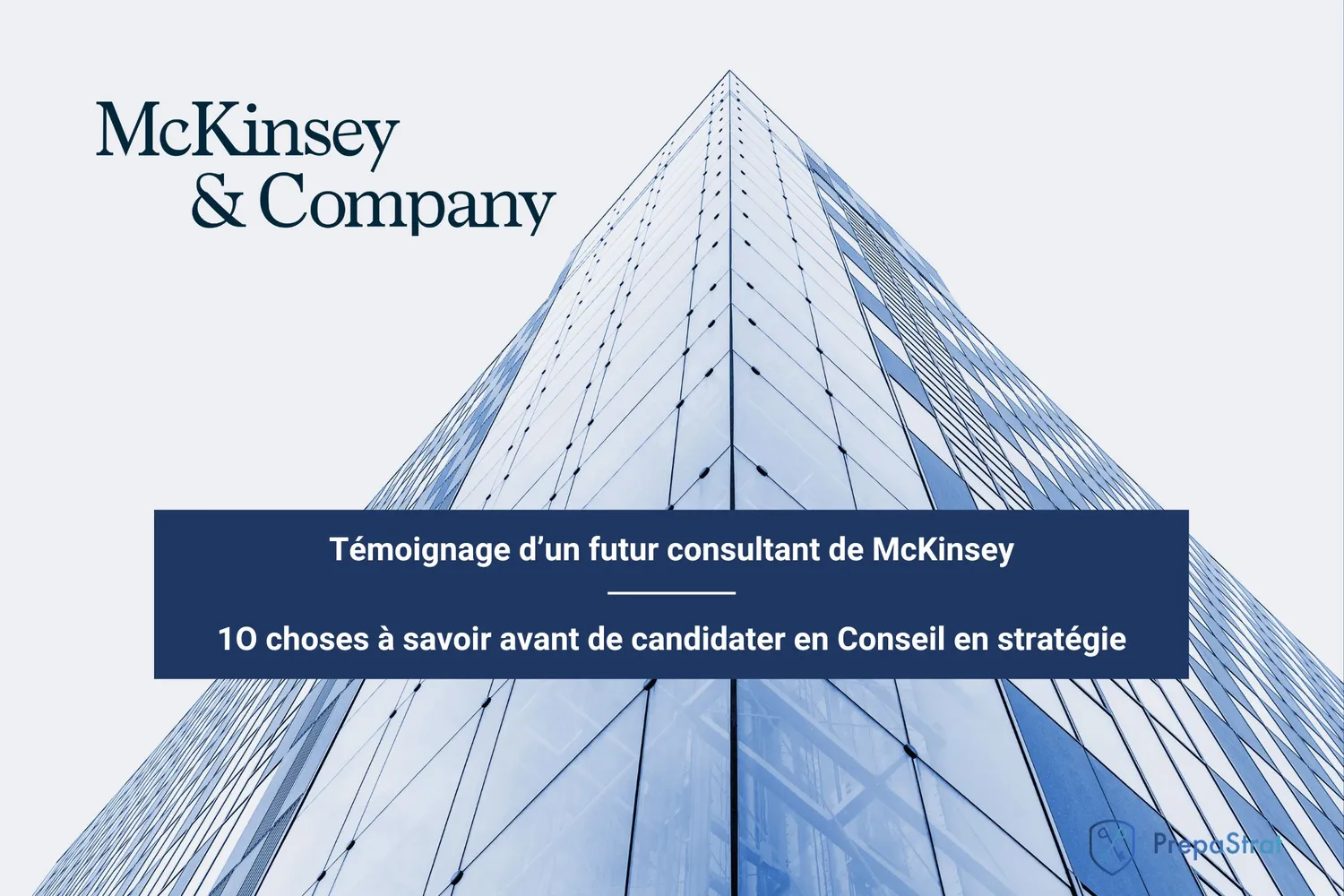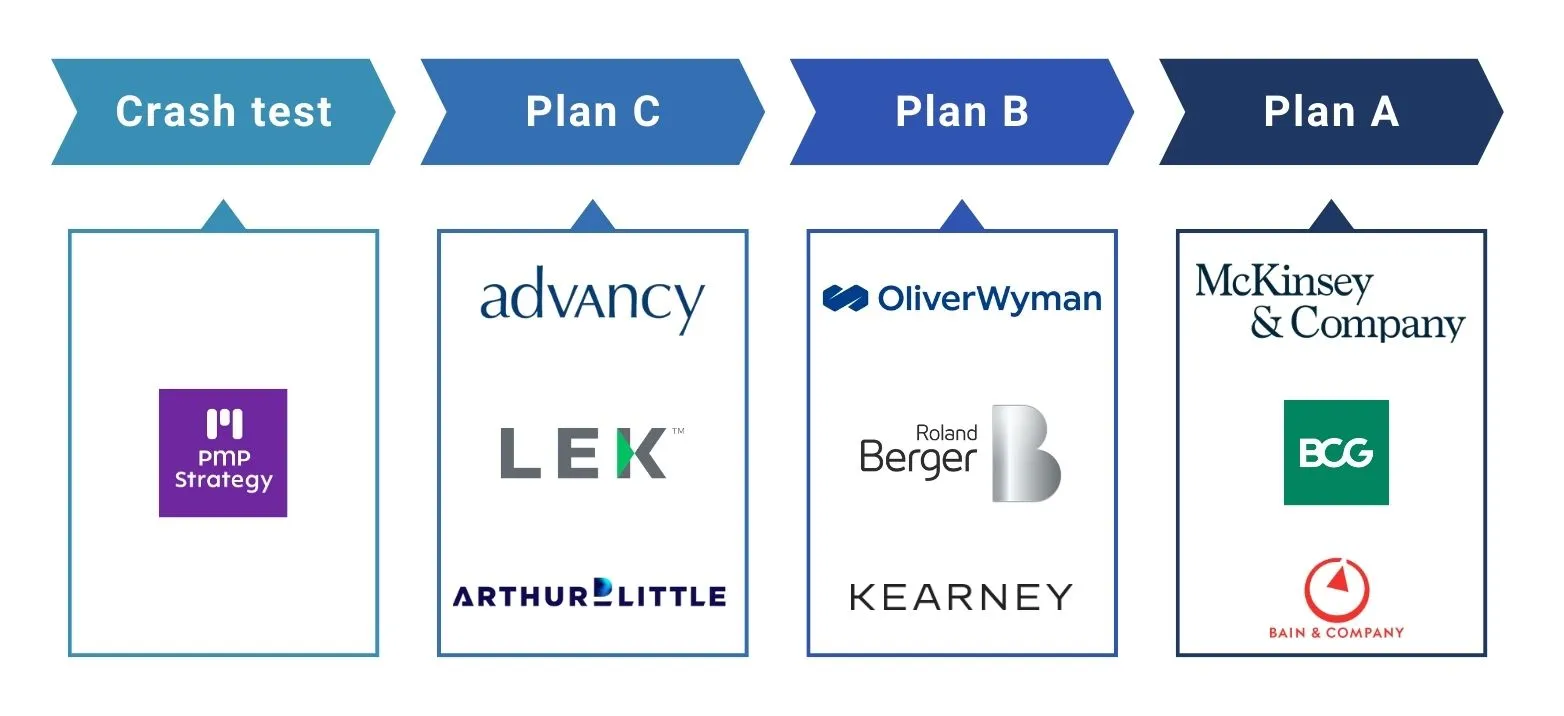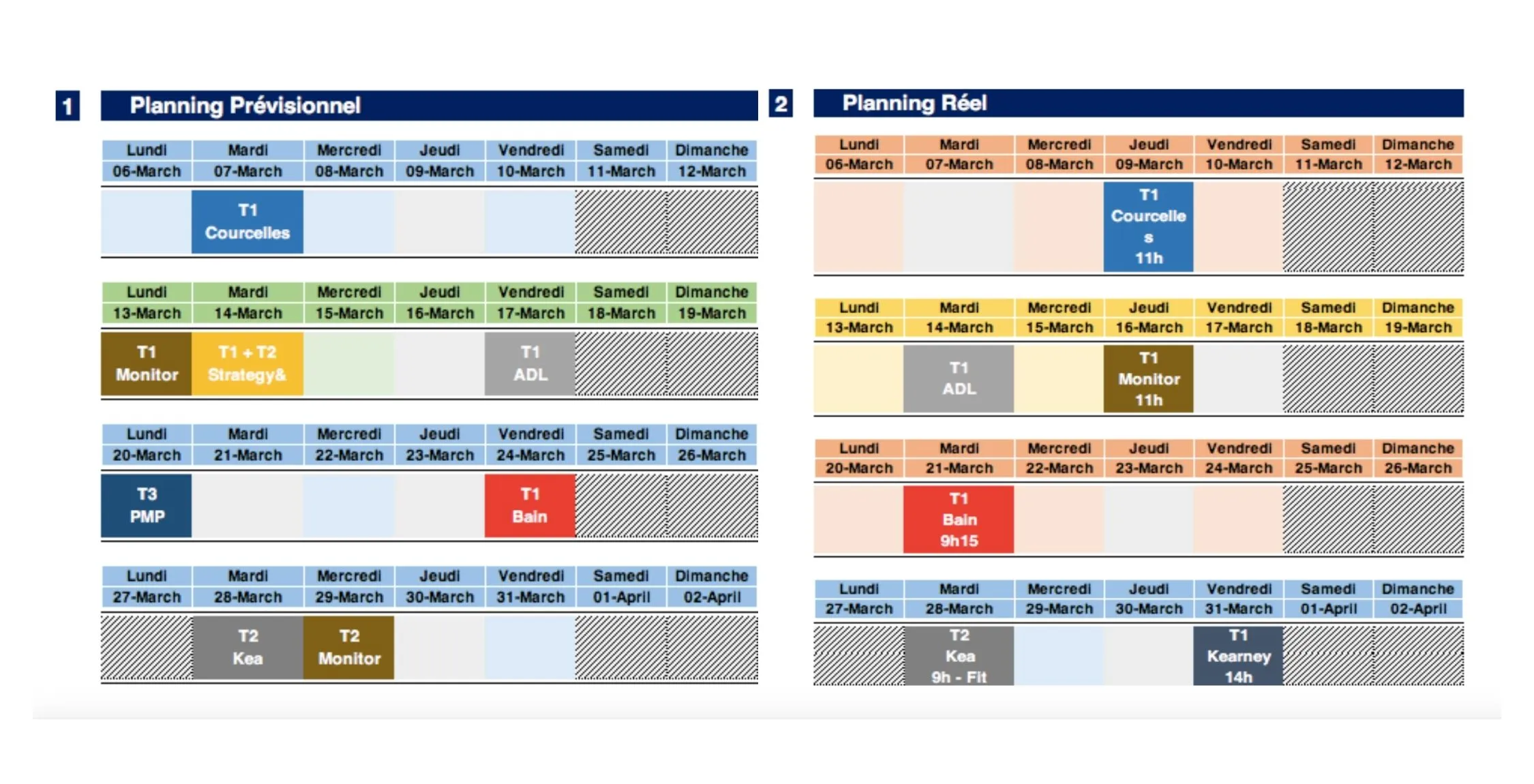
Recruiting to join a strategy consulting firm is a real marathon. For those aspiring to join the most prestigious firms such as McKinsey, BCG or Bain, the application process can be both exhilarating and mysterious. Joining one of these firms requires both mental and technical preparation. This article delves into the depths of this experience, offering valuable insight into the answers to the questions every candidate wishes they had had before embarking on the whirlwind of the strategy consultancy recruitment process. Based on the experience of a candidate who not only went through these interviews but, more importantly, received an offer from McKinsey, these questions go beyond mere technical skills to explore the often overlooked aspects of preparation, the crucial moments of the interview period, and even what happens afterwards, once the euphoria of the moment has worn off.
Get ready to enter the exciting world of strategy consulting recruitment, where the answers to the questions below will shed light on areas of uncertainty often left unanswered by candidates.
1. How many strategy consulting firms can I apply to?

This is a very important question, and one that naturally arises quite early on. I think all candidates have a clear idea of the 2-3 firms they're absolutely aiming for. For me, it was the MBBs, for others it may be the specialities of each firm or the affinity they have with certain consultants. The aim is to apply to enough firms to maximize your chances of getting an offer, but also to limit the number to avoid burning out. Personally, I applied to a total of 10 firms in order to have a plan A, B, C and a crash test. The crash test is the first firm you interview with to see what it's like, and for me it was PMP Strategy. Plan C is the firms that aren't your priorities, that will enable you to continue improving your interview skills, but which you would go to if you didn't have your plans A and B. For me, this was Advancy, LEK and Arthur D. Little. Little. Plan B is the firms that interest you but are not your ultimate goal, for me it was Kearney, Oliver Wyman and Roland Berger. Finally, plan A is your n°1 objective, so for me it was McKinsey, BCG and Bain. More than 10 firms becomes difficult to manage, but not impossible. Fewer than 10 means you don't spread yourself too thin. It's up to you to decide what you prefer.
2. When should you apply to strategy consulting firms?
You absolutely have to apply to all firms at least 1 month before your first interview. And you absolutely must apply to all firms at the same time. Why 1 month before? Because some firms take up to 1 month to get back to you, and most of them have online tests to take. So 1 month is a good time to organize your first tests. What's more, the first interview slots available with a firm can be 2 weeks to 1 month after your first HR call. Finally, firms are always willing to postpone interviews if necessary. So even if you get a quicker response than expected, you can schedule your first interview whenever you like. Personally, I applied at the end of January, had my first interview with a firm at the beginning of March, a first offer at the end of March and the McKinsey offer at the end of April, knowing that I hadn't completed all my processes.
3. How can I manage my interview schedule as a candidate?

Scheduling interviews for strategy consulting firms is a real gymnastic. Let's talk theory first. Ideally, you should first go through the recruitment process for your crash test, then go through the firm interviews for your plan C, before having a mix of firm interviews for your plan B and your plan A. This theory serves two purposes: to be able to test yourself on your crash test, build up your skills on your plan C, but not end up with your plan A, because you're likely to run out of interviews. Now, let's move on from theory to practice, because it never goes the way you want it to. In practice, I recommend that you draw up two interview schedules: an ideal forward schedule and an actual schedule. In the provisional schedule, set out the interviews from the 1st to the last round in each of the firms you're applying to: this will be your compass. In the actual schedule, enter your interviews as they are scheduled with the firms. Each time a firm calls to schedule a new interview, compare your projected schedule with your actual schedule to place the next interview in the best possible position. In this way, you remain in control of your time and your recruitment processes, which will be particularly important when you receive your first offers.
4. How many case studies should I practice before interviewing in Strategy Consulting?
To tell the truth, this question is often asked by candidates, but it's not very important because you shouldn't think like that, for two reasons. Firstly, some people feel ready at some point, while others never feel completely ready, no matter how many cases there are. Don't panic, it can happen and it's not serious, it's a very personal thing. Then, in reality, you're always making progress, and even more so when you go for your first interviews, so there's no need to feel 100% ready before throwing yourself in. Now that I've said that, I can give you an order of magnitude. After 20-30 cases, you'll probably feel comfortable with the exercise but perhaps not yet completely ready, which is a sign that you can launch your crash test and plan C interviews. When you start interviewing for real, slow down in your training, you can keep going but there's no need to burn out. You'll quickly reach a cumulative total of 40-50 cases before doing your Plan B and Plan A interviews. In the end, depending on how far you get in the recruitment process, you'll have done an average of over 60 cases, and that's more than enough. That's pretty much what happened to me, but take a step back. Some people will have done just 20 cases and received an offer from an MBB, others will have done 100 cases and received nothing. There is no absolute truth, only recommendations, and everyone should prepare at their own pace.
Practice your studies with our experienced consultants from McKinsey, BCG and Bain
5. How to prepare for the fit test in strategy consulting interviews?
Good question. Candidates know how to prepare case studies, but some underestimate the fit. Big mistake. Case studies are a prerequisite, but it's the fit that gets you an offer. Fit can be broken down into two main parts. The first is about you and your experiences. This is the fit part, where you'll have to tell your story and sell yourself. To do this, I recommend that you draw up a chronology of your past experiences, in particular the ones you want to highlight, presenting each time what you've done, the results obtained and what you've taken on. You should be able to pitch each experience in 1 or 2 minutes maximum, and go into greater depth if necessary. The second part deals with your motivations for joining this particular consultancy. Find out as much as you can about the profession and the firms by talking to as many consultants as possible. Finally, your motivations must be linked to your past experiences, so you need to create a guideline for your speech. Once you've prepared these two main parts, you can build your introductory pitch, which should last no more than 1 to 2 minutes. Last but not least, practice your fit! I've personally done a lot of fit sessions to test my ability to talk about my past experiences and present my motivations.
Read also: Everything you need to know about strategy consultants: assignments, careers, salaries
6. How to prepare for the Q&A part of strategy consulting interviews?
For the Q&A part, I think you need to prepare it just before the interview, depending on which consultants are interviewing you. Normally, you'll always have the name of the interviewer, so you can find out as much as you can about their profile and background, especially by using LinkedIn. A little anecdote: at McKinsey, you usually receive a biography of your interviewers the day before your interviews. Through this little preparatory work, try to find common ground, such as interests, internship experiences or associations. Also, be interested in the consultant's specialty within the firm, or his or her role in particular. You can prepare 2-3 questions on these subjects. I also recommend that you ask a question on a point raised during your interview, whether it's about the consultant's background or about an exchange you've had through a question. Bouncing back on a subject brought up during your interview shows your ability to listen and your curiosity, and leaves a great impression. Finally, I wouldn't recommend asking questions about the case study, even if you think you've succeeded, and especially if you think you haven't. The Q&A is there to help you stand out from the crowd, or to answer questions to which you don't have an easy answer.
7. What to do after each meeting with a strategy consulting firm?
Again, a great question, as many candidates sit back and do nothing after an interview. I think that, at the very least, a good candidate should thank his or her interviewer, whether or not you think the interview was a success. On your thank-you e-mail, you can add a little comment for the consultant to have more impact. For example, you could come back to a topic of discussion you had during the interview: "Further to our discussion on aeronautics during our interview, I'd like to share with you an article that appeared on BFM Business this morning. It echoes what you were telling me about alternative fuels". Without overdoing it, this kind of comment once again leaves a good impression and, above all, creates a bond with the consultant that goes beyond your simple interview. You leave the candidate-interviewer relationship behind. Obviously, it won't make any difference to you in terms of the interviewer's feedback, but if you go on to the next round, it will have its effect because the consultant will remember you.
8. How to manage negative feedback in your recruitment process?
It's not easy, it's something that's rarely mentioned but happens to 99% of candidates. First of all, I think you have to be able to step back from interviews, because there are a lot of things you can't control. Sometimes you'll feel like you've shone during an interview and it won't go down well, other times you'll feel like you've messed up and it will go down well. Interviews enable recruitment agencies to select the best candidates, but also to select the candidate profiles that match their immediate needs, and that's something you can't control. Of course, there's also the luck factor: you may come across an easy one or one you know during an interview. You may also get on very well with the interviewer, or not at all - again, you can't control that. Secondly, although it's hard to take negative feedback, you're applying to enough firms to have back-up plans. So instead of being a downer, it's absolutely vital that this motivates you to give it your best shot at the other interviews.
See also : How to join a strategy consulting firm
9. Is it possible to say "yes" and then "no" to an offer from a strategy consulting firm?
But it's not done. Some recruitment processes go faster than others, and you'll receive an offer before you've finished. The first thing to do is congratulate yourself! You've already received an offer, that's great, your back-up plan is secure. Next, ask for a cooling-off period before accepting the offer. One week is never a problem for firms, and you can even ask for 2 weeks. You're in a strong position. On the other hand, don't hesitate to speed up interviews with other firms, as they are often very reactive in such cases. You're at the heart of the competition for talent. If, despite this cooling-off period, you still haven't finished your other processes, you have three options: accept, refuse, tell the truth. If you accept and still intend to complete your other processes, then don't sign anything. An oral agreement following an internship offer is not binding, as the law states. If you refuse, it's to your credit, but you're effectively writing off your backup plan. Otherwise, you can tell the truth. Personally, that's what I did when I received an offer and was waiting to hear back from McKinsey. I told the firm in question that I wanted to complete my processes at McKinsey, maximum 2 weeks, to compare the offers if I had one, in order to make the best decision. I played on the fact that the permanent contract was an important commitment. The partner I was talking to understood and accepted. I'm not saying this is always the case, but it can be tempting. Finally, to avoid this situation as much as possible, plan your interviews as well as possible, using the famous target and actual schedules mentioned in question 3.
10. How do you prepare for your future job as a strategy consultant?
Once again, if you're asking yourself this question, it's because you've received an offer, so congratulations! There's no pressure, you'll take up your new position very naturally, with a training period of a few days to a few weeks at first, depending on the firm. Before that, take some time for yourself, finish your studies if necessary, travel if you can and get some rest. In my case, I even asked to postpone my start date so that I could finish my dissertation in peace and go travelling. In short, do what you want, but don't prepare for your new job.
Want to join a strategy consulting firm?
Then join us and be part of the 90% of our candidates who integrate a TOP 6 every year. PrepaStrat is the first interview preparation program for strategy consulting firms, with :
- 6 years of expertise, we're the oldest player in strategy consulting interview preparation
- 6 bootcamps per year, comprising 35 hours of training over 5 days
- 1 referent coach from an MBB for each supported candidate
- 100% of our coaches are Senior Consultants and Managers from McKinsey, BCG and Bain
- 6 online training modules to prepare you for interviews and understand what Strategy Consulting is all about
- 50+ corrected case studies that have already fallen into the hands of top strategy consulting firms
- Aim for excellence and join the top strategy consulting firms with Prépa Strat
Discover our bootcampour on-the-job interviews and our e-learning platform !